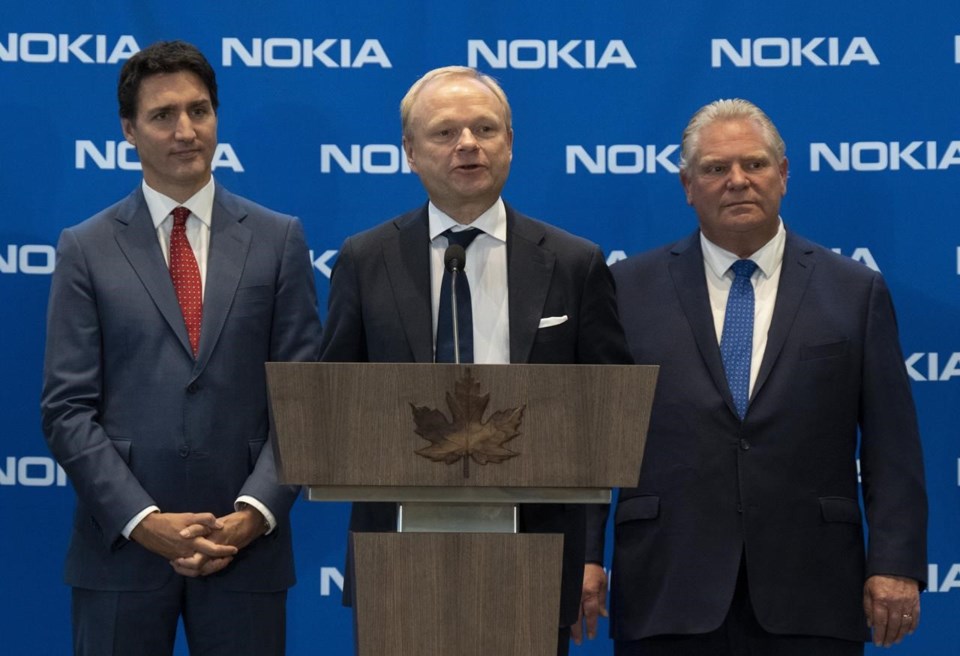OTTAWA — Nokia Canada, the federal government, Ontario government and City of Ottawa have announced plans to turn the company's Ottawa facility into a research and development technology hub, a move some industry watchers say is likely an effort to diversify away from Huawei as Canada looks to further its 5G wireless technology strategy.
"This expansion of the Nokia facility in Ottawa and Canada does suggest the ongoing attempts by the federal government to reduce the dependence of Canadian telecom companies on Huawei and ZTE, the two largest Chinese telecoms equipment makers, in favour of non-Chinese sources," said Dwayne Winseck, a communications professor at Carleton University.
In May, the federal government announced it was banning Huawei Technologies and ZTE from selling 5G equipment to Canadian telecom companies.
The Opposition Conservatives and other critics have long pressed the Liberals to deny Huawei a role in building the country's 5G infrastructure, arguing that it would allow Beijing to spy on Canadians more easily and give the company access to an array of digital information based on how Canadian customers use internet-connected devices.
Huawei still has significant research and development capacity within Canada, however, as the federal government has not taken action against the company's relationships with some of Canada's leading universities.
Christopher Parsons senior research associate at Citizen Lab said the expansion of Nokia's Ottawa facility announced Monday could be a possible attempt by the Trudeau government to gradually slow Huawei's ability to make use of Canada for research and development.
One of the challenges that Nokia and other Western companies have faced is they have had less money to invest in basic research, Parsons explained, as compared to their competitor Huawei.
"We may see further pressure from Ottawa that will serve to encourage scientists, engineers and other parties who work for Huawei now, or other companies, to come over and switch over to the Nokia campus," he said.
The project will transform Nokia's 26-acre campus at the Kanata North Business Park into a mixed-use corporate, residential and commercial hub. The project will also receive $72-million in total funding from the three levels of government.
Breaking the funding down, Nokia will invest $340 million in labs and equipment, labour, and operating costs between 2023 and 2027, while the federal government will provide up to $40 million via its Strategic Innovation Fund.
The provincial government, through Invest Ontario, will provide $30 million to the project, while the City of Ottawa, through Hydro Ottawa, will make a capital contribution of $2 million for control system upgrades.
Nokia said the tech hub will also significantly expand its capacity in cyber security, artificial intelligence and machine learning.
The federal government said the announcement is a step toward strengthening Canada’s wireless network and will help pave the way for new opportunities in the areas of clean energy, smart cities, precision agriculture, autonomous vehicles, and advanced telemedicine.
"Today’s announcement reinforces Nokia’s commitment to the Canadian market, where we have invested $1.4 billion in R&D over the past five years," said Nokia Canada president Jeffrey Maddox, in a statement.
Nokia plans to begin site construction in 2023 and expects to open the new facility in 2026.
"I think it's important to build up muscularity of research and development in companies that are more aligned with Canadian interests," Parsons said.
"Canada may also be trying to enable Nokia to better compete on the international markets, and by extension, ensure that Canada has, in Canadian telecommunications vendors, access to high quality 5G and 6G technologies going into the future."
He added that it could take some time before impact from the tech hub is felt.
The project is expected to create more than 340 new jobs — growing its Ontario-based team to 2,500 — and help Nokia attract highly-skilled, global talent to Canada’s tech ecosystem.
Nokia said the new Ottawa facility will also support the company's global target of 50 per cent greenhouse gas emission reduction by 2030 by implementing sustainable technologies, including water side heat recovery, air side heat and energy recovery, water side free cooling, and rainwater harvesting.
This report by The Canadian Press was first published Oct. 17, 2022.
The Canadian Press

